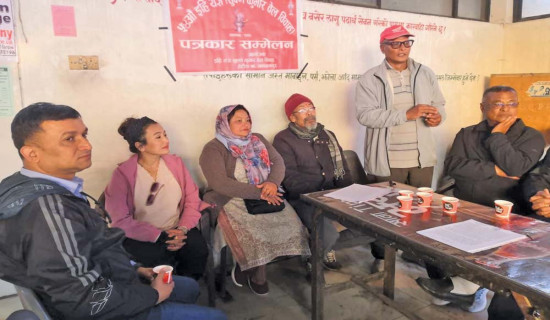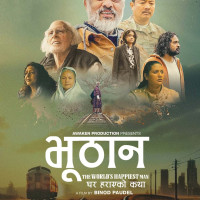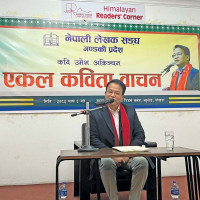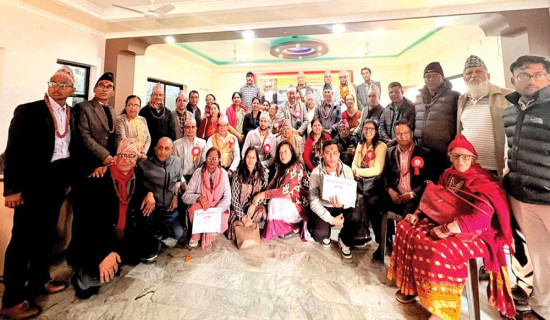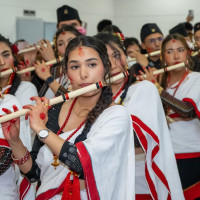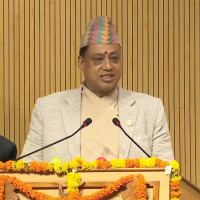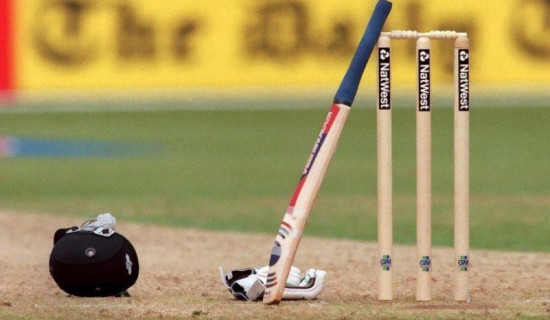- Thursday, 22 January 2026
Maghi festival celebrations bring cultural revival and unity
By A Staff Reporter,Kathmandu, Jan. 12: The winter is at its peak, with fog and cold winds sweeping through the air. Despite the chill, the Tharu settlement is buzzing with the warmth of dance and song as people of all ages come together to celebrate the Maghi festival.
Maghi, the biggest festival of the Tharu community, marks the beginning of a new season and is an important occasion for them. The entire settlement is buzzing with Maghauta dances and the lively beats of Dhamar and Dhumru songs.
The Tharu community traditionally celebrates the Maghi festival from the last day of the Poush month to the second day of the Magh month. On the first day, known as ‘Jita Marne,’ celebrations begin in the morning with the preparation of delicious dishes, especially pork, in every household.
The first day of Magh marks the end of the Tharu Sambat (the Tharu calendar year), and it is customary to celebrate with joy and festivities, leaving behind the hardships of the past year.
Magh 1, which falls on the first day of the festival, is also the start of the Tharu New Year.
On New Year’s Day, people wake up early, bathe in nearby rivers, ponds and streams, and seek blessings from their elders while offering blessings to the younger generation. The day is filled with exchanges of greetings, love and affection, as old grudges are forgotten. Traditional foods like meat, Dhikri, yam and various other dishes are enjoyed by all.
Maghi is also a festival of emancipation for the Tharu people. In the past, it was the time when Kamaiya (bonded laborers) and Kamalhari (female laborers) were liberated from the control of their landowners. This liberation is celebrated as a symbol of independence, marking a new chapter in the lives of the freed Kamaiya and Kamalhari.
Following the conclusion of the Maghi festival, the Tharu community embarks on new beginnings, such as weddings, building new homes and starting other important projects. According to Tharu leader Dil Bahadur Chaudhary, Maghi is a festival of great religious, cultural, social and economic significance.
The festival also marks the return of people who had been away during Dashain and Tihar, as they return home to reunite with their families.
As part of the New Year celebrations, the community will elect new leaders, priests, postmen, guards and house leaders for the upcoming year. The Tharus, an indigenous ethnic group of Nepal, are known for their rich cultural traditions and customs. They have lived in 23 districts across the inner Terai and Terai region, stretching from Jhapa in the east to Kanchanpur in the west.
The final day of the festival is called ‘Khojnibojni,’ during which the community reflects on the previous financial year and plans for the upcoming one. On this day, a leader is chosen to guide the village for the year ahead. Married daughters are also given a gift of rice, known as "Nisrau," by their parents.
This year too, the ancient Tharu community living in Kathmandu is celebrating Maghi on January 15 in the capital, with the aim of raising awareness about their culture and heritage.
The Tharu National Maghi Festival Main Organising Committee is hosting a two-day celebration at Tundikhel on January 13 and 14. The committee organised the press conference on Friday in Kathmandu, highlighting that the festival would be celebrated with great enthusiasm.
Since 2002, the Tharu community in Kathmandu has been celebrating Maghi, and this year’s event will focus on raising public awareness about Tharu culture and language. On the first day, a Jita Marna ceremony will take place, along with a blood donation programme. The second day will feature the main Maghi festival.
Prime Minister KP Sharma Oli is set to inaugurate the festival, which will feature more than 100 stalls, including those showcasing Tharu food, handicrafts and books. The festival will also include cultural performances. To promote the event, a motorcycle rally will start from Tinkune at 7:00 AM on January 13 and conclude at Bhrikutimandap.
On January 14, the main day of the festival, participants will wear traditional Tharu clothing and ornaments, play musical instruments and carry the banners of their associations as part of a festive rally.



